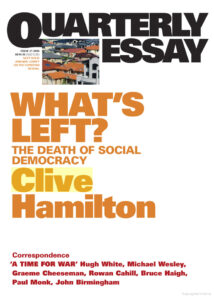This essay throws out a challenge to Australia’s social democratic party, both the true believers and the right-wing machine men. It argues that the Labor Party has served its historical purpose and will wither and fade as the progressive political force in Australia.
Some arguments from the essay …
The idea of the citizen on which social democracy was historically founded has been transformed. Social democracy saw the individual as a member of a class engaged primarily in an economic struggle, from which was derived an identity and a place in the social order. Today, we go to the market to find an identity, to adopt a persona that reflects our desired self onto the world.
…
As a consequence of self-focussed individualism, the old idea of solidarity, the emotion that powered social democracy, has little meaning today. People are no longer drawn together by their oppression, united against a common enemy, or bound by a shared cultural history. In place of solidarity, they aspire to occupy a position superior to that of their peers, or at least to differentiate themselves from them, so as to assert their uniqueness.
…
For most thinkers of the Left, lack of justice remains the defining characteristic of modern capitalist society, and the central focus of political activity in order to achieve a better society is to overcome injustice. For some social democrats, the foundations of injustice lie in the nature of capitalism and the economic pressures to inequality must be countered by political activism designed to bring greater fairness to the system. For others, reflecting the influence of the new social movements, injustice is located in the domain of culture and the defeat of injustice lies in social change as well as political activism. Whether understood as inequality in the distribution of resources or in misrecognition of individuals and groups, it is the struggle against injustice that defines and gives enduring relevance to social democracy.
Against this, I maintain that the defining problem of modern industrial society is not injustice but alienation, and that the central task of progressive politics today is to achieve not equality, but liberation. Social democracy as we understand it cannot deliver this goal and a new politics is required.
I am not arguing that all problems have been solved and injustice no longer exists. That is patently not true. But – and this is my fundamental point – they cannot be understood as structural characteristics of modern capitalism. It is perfectly feasible to imagine a social and economic structure in all essentials the same, but in which, in particular, poverty is much diminished, the circumstances and opportunities for indigenous Australians are vastly improved, and people with disabilities are respected and cared for.
The fact is that neo-liberalism has fulfilled its promise of prosperity, delivering large increases in incomes across the board. It is simply untrue that the rich get richer and the poor inevitably get poorer.





